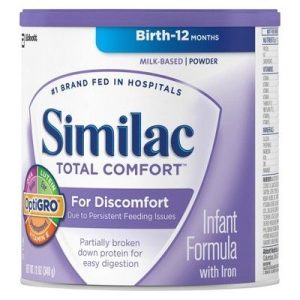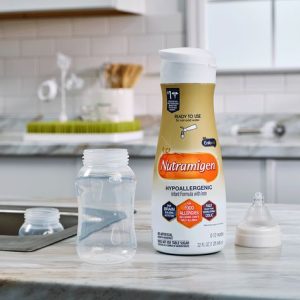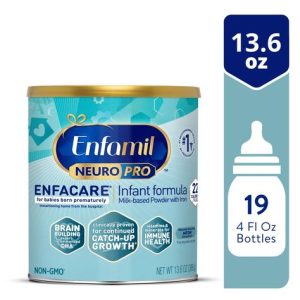Formula is essential for feeding babies who are not breastfed. However, formula doesn’t last forever, and it’s important to use it before the expiration date. So, what should you do if you find yourself with formula?
Throwing it away might seem like the only option, but there are actually a few other things you can consider. In this article, we’ll explore safe disposal methods and some alternatives for formula.
Why Not Use Expired Formula?
Formula companies set expiration dates to ensure the nutritional quality and safety of the product. Here’s why expired formula isn’t recommended:
Nutrient Loss:
Over time, vitamins, minerals, and other essential nutrients in formula can break down. This means your baby won’t get the nutrients they need to grow and develop properly.
Spoilage Risk:
Expired formula is more likely to spoil or grow bacteria, which can lead to foodborne illness in babies. Symptoms of foodborne illness can be severe and dehydration is a particular concern for babies.
Allergic Reaction:
Even if it doesn’t spoil, expired formula may irritate your baby’s digestive system or cause an allergic reaction.
Safe Disposal Methods for Expired Formula
If you can’t return or donate expired formula (more on that below), it’s important to dispose of it safely. Here’s how:
-
Empty the liquid formula: Pour liquid formula down the drain. However, check with your local municipality to see if they have any specific guidelines for disposing of formula.
-
Throw away the container: Once empty, toss the formula container, lid, and scoop in the trash.
-
Safety first: Never microwave or reuse formula containers.
Alternatives to Throwing Away Expired Formula
In some cases, you may be able to avoid throwing away expired formula altogether. Here are a couple of options:
-
Return it to the store: Some stores have policies that allow you to return unused formula, even if it’s expired. Contact your local store to see if they have such a program.
-
Donate it to a food bank: Food banks often accept unopened formula donations. However, call ahead to confirm their policy on expired formula.
Important Note: These options are only suitable if the formula is unopened and the expiration date hasn’t passed by a significant amount of time. Always check with the store or food bank before donating.
If you’re unsure about the safety of your expired formula, the safest option is always to throw it away. Remember, your baby’s health is the top priority.
Keeping Formula Fresh
Here are some tips to help prevent formula waste and keep your baby’s formula fresh:
-
Buy only what you need: Don’t stockpile formula. Buy what you’ll use within the expiration date.
-
Store it properly: Keep unopened formula in a cool, dry place. Once opened, store formula in the refrigerator and use it within 24 hours.
-
Track expiration dates: Keep track of expiration dates and use the oldest formula first.
By following these tips, you can ensure that your baby always has access to safe and healthy formula.
Expired formula can be a dilemma, but there are safe ways to dispose of it or possibly even donate it. Remember, if in doubt, throw it out. The most important thing is to prioritize your baby’s health by using safe and fresh formula.
Safe Disposal Methods for Expired Formula
1. Check Local Guidelines
Research local regulations regarding the disposal of expired formula. Some areas have specific guidelines for discarding infant formula due to its classification as a food product.
2. Dispose of Unopened Formula
If the formula is unopened and within its expiration date, consider donating it to local food banks or charities that support families in need. Ensure the formula packaging is intact and unaltered for safety reasons.
3. Discard Expired Formula Safely
For expired formula that cannot be donated or used safely, follow these steps for disposal:
- Step 1: Pour unused formula down the sink with running water to dilute it.
- Step 2: Recycle the empty formula container if possible, following recycling guidelines in your area.
- Step 3: Avoid flushing formula down the toilet, as it can contribute to water pollution.
Creative Ways to Repurpose Formula Containers
1. Storage Containers
Clean and sanitize empty formula containers for use as storage containers for small items like buttons, craft supplies, or snacks.
2. DIY Projects
Transform empty formula containers into creative DIY projects such as homemade piggy banks, flower vases, or organizers for household items.
3. Gardening Uses
Use formula containers as small planters for herbs or succulents. Ensure proper drainage by poking holes in the bottom before planting.

Donating Expired Formula Safely
If you have unopened formula that has expired but remains within its packaging and seals, donating it can be a thoughtful way to support families in need. Here’s how you can donate expired formula responsibly:
1. Contact Local Charities or Food Banks
Reach out to local charities, food banks, or organizations that specialize in distributing infant formula to families. Confirm if they accept donations of expired formula and inquire about their specific guidelines for donation.
2. Verify Packaging Integrity
Ensure that the formula packaging is intact and has not been tampered with. Most organizations will only accept unopened and undamaged formula for distribution to ensure safety and quality.
3. Follow Donation Guidelines
Adhere to any specific instructions provided by the charity or food bank regarding the donation process. This may include labeling the donation clearly or arranging a drop-off or pick-up time.
Environmental Impact Considerations
1. Avoiding Water Pollution
Never dispose of formula by pouring it down the drain or flushing it down the toilet. This prevents potential contamination of water sources and helps protect the environment.
2. Proper Container Disposal
Dispose of empty formula containers responsibly by recycling them or repurposing them for other household uses. This minimizes waste and supports recycling efforts in your community.
Conclusion: Responsible Handling of Expired Formula
Properly managing formula ensures the safety of infants and contributes to environmental responsibility. Whether donating unopened formula or responsibly disposing of expired products, these actions support both community needs and environmental sustainability.
By understanding the risks of using formula and implementing safe disposal methods, caregivers can prioritize infant health and contribute positively to their community.




